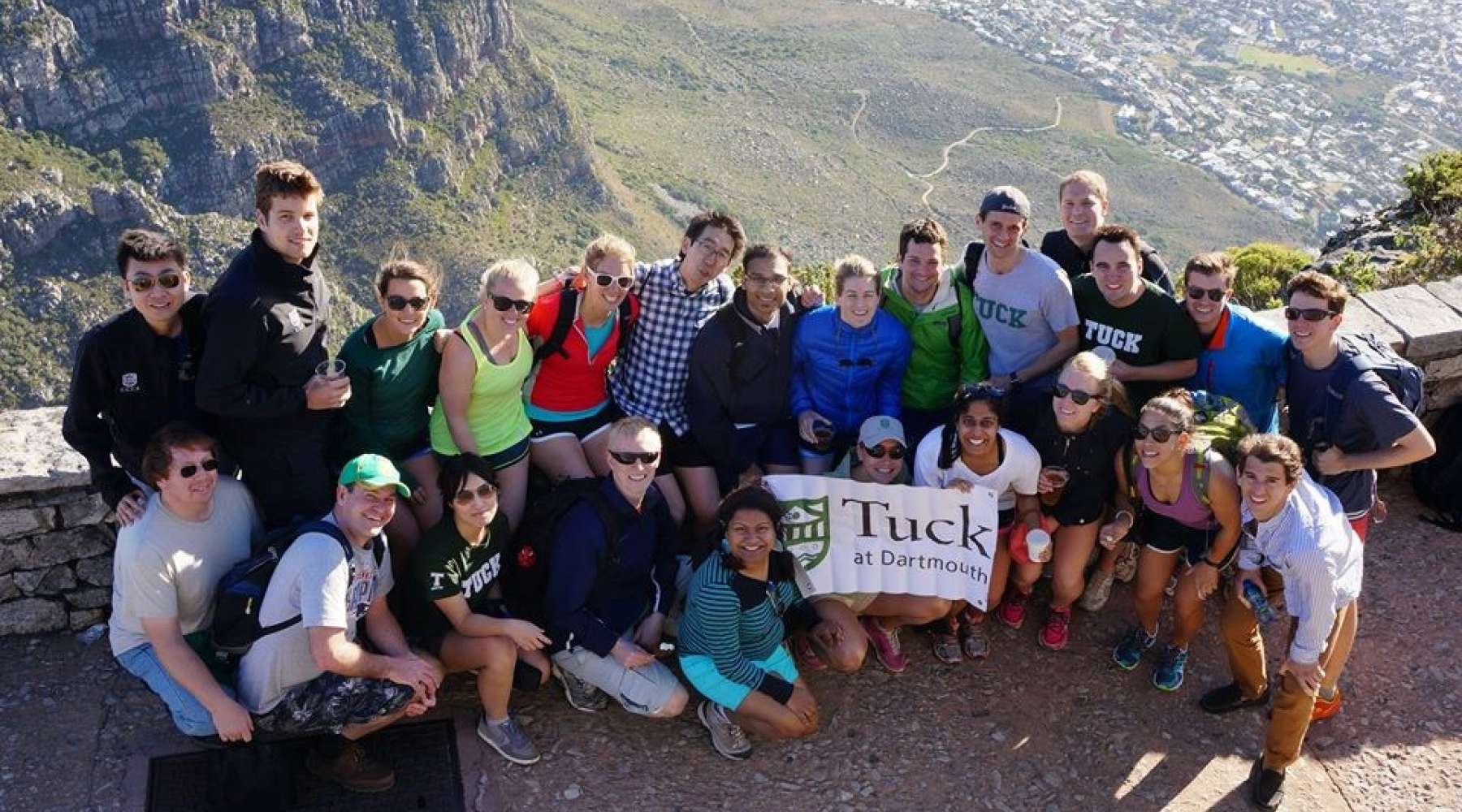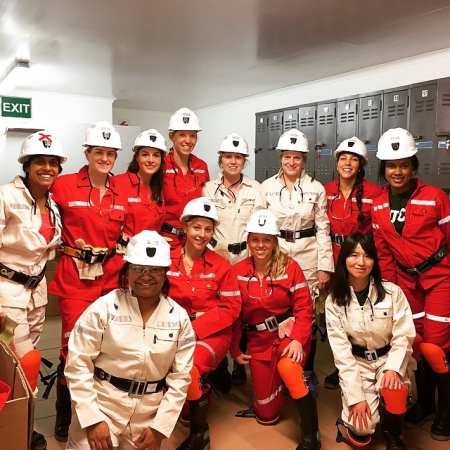
By Jane Shiverick T’15, Tuck Bridge ’08
 Jane grew up in Bronxville, NY. She graduated from Trinity College in 2008 with a double major in psychology and Italian studies. Before Tuck, she worked in New York City in wine import and distribution.
Jane grew up in Bronxville, NY. She graduated from Trinity College in 2008 with a double major in psychology and Italian studies. Before Tuck, she worked in New York City in wine import and distribution.
I spent my spring break in South Africa, traveling with 25 Tuck students on a trip led by Tuck’s very own native South African, Phil Stocken, associate dean for the MBA program and a professor of accounting. This trip was one of the more popular Global Insight Expeditions (GIX) that students have the option of enrolling in during spring break each year. The expedition earns you course credit and counts toward the new global requirement that is now part of the Tuck curriculum.
Traveling with Dean Stocken presented a unique opportunity to see South Africa and gain a deeper understanding of the country than would likely be possible for the typical tourist on a safari. That being said, we did have the pleasure of spending a couple days at a bush lodge taking in the beautiful landscape and admiring the wild animals!
We had special access to a set of South Africa’s most prominent companies (Eskom, Sasol, Anglo American, Pick n’ Pay), exposing us to the opportunities and challenges these businesses face. The nation has undergone considerable transformation in the past two decades following the collapse of the apartheid system, thus it is an interesting time to experience first-hand the social, economic, and political climate, and to discover what it all means for businesses today in South Africa.
The country has been experiencing rolling blackouts of electricity as a result of capacity challenges at the centralized power utility, Eskom. As one can imagine, rolling blackouts present huge problems for businesses. Imagine running a national grocery chain and dealing with these outages! We learned that Pick n’ Pay, the leading grocery chain, has had to install generators in all of its stores, lest all of the ice cream melt and the milk spoil. Simultaneously, booming demand for residential power generators is causing such units to fly off the shelves in Pick n’ Pay stores, providing a slightly positive twist on the electricity challenge and its impact on business (if you are in the business of selling power generators).
One business that we also visited that is exempt from the “load shedding” (the term for the planned power outages) is Anglo  American, one of the world’s largest mining companies, with a substantial part of its operations based in South Africa. This mining giant is exempt due to the catastrophe that would result from an underground mine losing power. We learned about this issue first-hand as we went down in the mine. It was clear very quickly that one would really would not want the lights or water pumps to go out down there. Donning fashionable jumpsuits, hard hats, and miner’s lamps, we journeyed deep down into the earth at one of Anglo American’s platinum mines. The scale of the operation in a mine certainly makes you appreciate the capital intensive nature of the mining industry, and the grueling labor required to extract minerals from the earth. Crawling on your hands and knees through a platinum ore is not a job for the claustrophobic!
American, one of the world’s largest mining companies, with a substantial part of its operations based in South Africa. This mining giant is exempt due to the catastrophe that would result from an underground mine losing power. We learned about this issue first-hand as we went down in the mine. It was clear very quickly that one would really would not want the lights or water pumps to go out down there. Donning fashionable jumpsuits, hard hats, and miner’s lamps, we journeyed deep down into the earth at one of Anglo American’s platinum mines. The scale of the operation in a mine certainly makes you appreciate the capital intensive nature of the mining industry, and the grueling labor required to extract minerals from the earth. Crawling on your hands and knees through a platinum ore is not a job for the claustrophobic!
Another element of the current climate in South Africa is income inequality. Companies shouldn't ignore this issue, as they are responsible for the well-being of their employees and for ensuring a healthy and capable workforce. The grocery chain, Pick n’ Pay, was notably forward-thinking about investing in its employees—ensuring store workers were provided with safe transportation to and from work, and access to meals and clothing. Pick n’ Pay also invested in its suppliers—supporting small farmers and entrepreneurs and helping them to grow their own businesses, and to create wealth and income stability in their communities. We also visited a small, for-profit company called MonkeyBiz that empowered women in impoverished townships by providing a way to earn income through craft-making. These companies exemplify the power—and responsibility—that businesses have to improve their communities, particularly in a country grappling with 25 percent unemployment and massive income inequality.
This GIX wasn’t all business, however. Our group enjoyed game drives in Pilanesburg National Park, a rewarding hike up Cape Town’s iconic Table Mountain, scenic drives along the Cape Town peninsula, a wine tasting at the notable Klein Constantia winery, and the pleasure of each other’s company over sundowner cocktails each evening.
A home-cooked meal is arguably the best perk of traveling with a local when you are far from home. The trip concluded with a memorable dinner provided by Dean Stocken’s sister and brother-in-law, who graciously treated us to a spectacular braai (a traditional South African barbecue) at their beautiful home in Cape Town.
(Photo above: Tuck students hike to the top of Table Mountain and enjoyed a well-earned panoramic view of beautiful Cape Town. Photo at right: Tuck students prepare to head down an elevator approximately 100 stories down into the earth at the Anglo American platinum mine.)